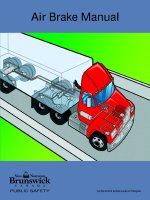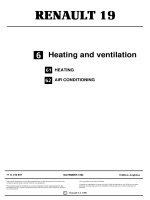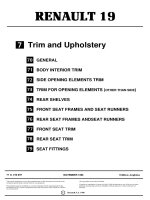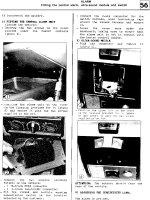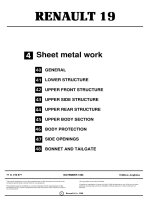Manual-Intecont-Tersus
Bạn đang xem bản rút gọn của tài liệu. Xem và tải ngay bản đầy đủ của tài liệu tại đây (2.39 MB, 176 trang )
INTECONT® Tersus Weighfeeder
Instruction Manual
BV-H2463 GB
PASS - Service you can rely on
Fast, comprehensive, anywhere in the world
Quality and reliability are the cornerstones of our company’s
philosophy. That is why we consider a comprehensive service
concept simply par for the course, from strict quality control,
installation and commissioning through to seamless support
across the entire product life cycle.
With over 30 service stations and over 180 service specialists,
you can count on us to be there whenever – and wherever –
you need us.
It doesn’t matter where you are, our specialists are there to
advise and assist with the best in worldwide, personal, comprehensive service.
During office hours, service specialists from all divisions are
on hand to analyze problems and failures. Look at
www.schenckprocess.com for your nearest
Schenck Process Location.
Customized to meet your requirements, our comprehensive
Process Advanced Service System provides you with the best
service. Are you looking for individual, perfect-fit service solutions?
Then our service system PASS is the ticket. It covers the entire service spectrum, from simple inspections through to full
service. Interested?
Then find out more about the individual components at
www.schenckprocess.com/en/service.
â by Schenck Process GmbH
Pallaswiesenstraòe 100, 64293 Darmstadt, Germany
Phone: +49 6151 1531-0
www.schenckprocess.com
All rights reserved. Any reproduction of this documentation,
regardless of method, without prior permission by
Schenck Process GmbH in writing, even by excerpt, is prohibited.
Subject to change without prior notice.
Note: Translation of the original German Instruction
Table of Contents
Table of Contents
1
About This Manual ................................................................
................................................................................................
................................................................................................
.................................................................
................................. 1
2 Safety notes................................
notes................................................................
................................................................................................
................................................................................................
...........................................................................
........................................... 3
2.1
Signal Words .......................................................................................................................................... 5
2.1.1
Signal Words for Safety Warnings ................................................................................................. 5
2.1.2
Signal Words for Application Notes ............................................................................................... 5
2.2
Five Safety Rules of Electrical Engineering ........................................................................................... 6
2.3
Damaged / Defective Electrical Components ......................................................................................... 6
3 General Diagram ................................................................
................................................................................................
................................................................................................
...................................................................
................................... 7
3.1
An overview of the INTECONT Tersus .................................................................................................. 7
3.2
The basic diagram of the weighfeeder ................................................................................................... 8
3.3
Method of Function ................................................................................................................................. 9
3.4
Characteristics ......................................................................................................................................10
4 Operation................................................................
................................................................................................
................................................................................................
.............................................................................
............................................. 15
4.1
Quick guide ...........................................................................................................................................15
4.2
Function block.......................................................................................................................................17
4.3
Operating in Normal Operation.............................................................................................................18
5 Service Functions ................................................................
................................................................................................
................................................................................................
................................................................ 21
5.1
Display Test and Version Number ........................................................................................................21
6
Counter functions ................................................................
................................................................................................
................................................................................................
.................................................................
................................. 23
7 Mode functions ................................................................
................................................................................................
................................................................................................
....................................................................
.................................... 25
7.1
Types of operation ................................................................................................................................25
7.2
Keyboard operation ON/OFF................................................................................................................26
7.3
Prefeeder ..............................................................................................................................................26
7.4
Simulation .............................................................................................................................................27
8 Calibration
Calibration functions ................................................................
................................................................................................
............................................................................................
............................................................ 29
8.1
Starting the calibration functions ..........................................................................................................29
8.2
Pulse/Belt circuit LB .............................................................................................................................30
8.3
Tare TW ................................................................................................................................................31
8.4
Weight Check CW ................................................................................................................................33
8.5
Setting the Time ...................................................................................................................................35
9 Parameter functions ................................................................
................................................................................................
.............................................................................................
............................................................. 37
9.1
Read Parameters ................................................................................................................................37
10 Printer functions ................................................................
................................................................................................
................................................................................................
...................................................................
................................... 39
10.1 Status Report ........................................................................................................................................40
11 Batching functions ................................................................
................................................................................................
...............................................................................................
............................................................... 41
11.1 Batching mode ......................................................................................................................................41
11.2 Record the batch ..................................................................................................................................43
INTECONT® Tersus Weighfeeder, Instruction Manual
Schenck Process Group
BV-H2463GB, 1149
-i-
Table of Contents
12 Startup operation ................................................................
................................................................................................
................................................................................................
.................................................................
................................. 45
12.1 Weighing Platforms ..............................................................................................................................45
12.1.1
Effective Weighing Platform Length ............................................................................................45
12.1.2
Calibration Weight ........................................................................................................................47
12.1.3
Belt inclination .............................................................................................................................49
12.2 Parameter Input ....................................................................................................................................49
12.3 Function Check .....................................................................................................................................51
12.4 Test With Calibration Weight ................................................................................................................51
12.5 Belt Velocity Check ...............................................................................................................................52
12.6 Test with Material .................................................................................................................................52
13 Parameters ................................................................
................................................................................................
................................................................................................
..........................................................................
.......................................... 53
13.1 Abbreviations ........................................................................................................................................54
13.2 Configuring Event Messages................................................................................................................55
13.3 Parameter Listing ................................................................................................................................55
13.3.1
Parameter Overview ....................................................................................................................55
13.3.2
Parameter Details ........................................................................................................................65
13.3.2.1 Parameter Block 01 - Dialog Behaviour .......................................................................................65
13.3.2.2 Parameter Block 02 - Rated Data ................................................................................................69
13.3.2.3 Parameter Block 03 - Calibration Data ........................................................................................73
13.3.2.4 Parameter Block 04 - Calibrat. Results ........................................................................................74
13.3.2.5 Parameter Block 05 - Analog Outputs .........................................................................................74
13.3.2.6 Parameter Block 06 - Limit Values ...............................................................................................77
13.3.2.7 Parameter Block 07 - Filters.........................................................................................................80
13.3.2.8 Parameter Block 08 - Additional device .......................................................................................81
13.3.2.9 Parameter Block 09 - Batch Mode ...............................................................................................82
13.3.2.1 Parameter Block 10 - Printer Setting ...........................................................................................83
0
13.3.2.1
Parameter Block 11 - Maintenance interval .................................................................................84
1
13.3.2.1 Parameter Block 12 - Belt Monitoring ..........................................................................................85
2
13.3.2.1
Parameter Block 13 - Events .......................................................................................................88
3
13.3.2.1
Parameter Block 14 - Rate controller ...........................................................................................91
4
13.3.2.1
Parameter Block 15 - Linearization ..............................................................................................97
5
13.3.2.1
Parameter Block 16 - Digital Inputs .............................................................................................99
6
13.3.2.1
Parameter Block 17 - Digital Outputs .........................................................................................100
7
13.3.2.1 Parameter Block 18 - Communication EasyServe .....................................................................103
8
13.3.2.1
Parameter Block 19 - Communication Fieldbus.........................................................................104
9
13.3.2.2
Parameter Block 20 - Fixed mode configuration ........................................................................109
0
13.3.2.2
Parameter Block 21 - Ethernet ...................................................................................................111
1
13.3.2.2
Parameter Block 22 - Data Logging ...........................................................................................111
2
13.3.2.2 Parameter Block 23 - Configuration HMI Values .......................................................................114
3
13.3.2.2
Parameter Block 24 - Second Display .......................................................................................116
4
14 Event messages ................................................................
................................................................................................
................................................................................................
................................................................ 119
BV-H2463GB, 1149
- ii -
INTECONT® Tersus Weighfeeder, Instruction Manual
Schenck Process Group
Table of Contents
15 Events ................................................................
................................................................................................
................................................................................................
...............................................................................
............................................... 121
15.1 Events Details .....................................................................................................................................121
15.1.1
Event Group: Calibration ............................................................................................................121
15.1.2
Event Group: Controller .............................................................................................................121
15.1.3
Event Group: Electrical System .................................................................................................122
15.1.4
Event Group: Interlock ...............................................................................................................122
15.1.5
Event Group: Material Flow........................................................................................................122
15.1.6
Event Group: MAX .....................................................................................................................123
15.1.7
Event Group: Mechanic ..............................................................................................................124
15.1.8
Event Group: MIN ......................................................................................................................124
15.1.9
Event Group: Sequence Monitoring ...........................................................................................125
15.1.10
Event Group: System Message .................................................................................................126
16 Hardware and technical data................................................................
................................................................................................
..............................................................................
.............................................. 129
16.1 Technical Data and Replacement Parts .............................................................................................129
16.2 Connection Diagrams .........................................................................................................................131
16.3 Replacing INTECONT PLUS with INTECONT Tersus .......................................................................133
16.4 PROFIBUS module (VPB8020) ..........................................................................................................136
16.5 DeviceNet Module (VCB8020) ..........................................................................................................138
16.6 Modbus Interface VSS8020................................................................................................................140
16.7 LED diagnosis.....................................................................................................................................141
17 Web server functions ................................................................
................................................................................................
.........................................................................................
......................................................... 143
17.1 Web Server .........................................................................................................................................143
17.2 System Information .............................................................................................................................143
18 Appendix ................................................................
................................................................................................
................................................................................................
...........................................................................
........................................... 145
18.1 Service Values ....................................................................................................................................145
18.2 Set option............................................................................................................................................146
18.3 Function Check ...................................................................................................................................147
18.4 Test Connector ...................................................................................................................................148
18.5 Sources of Setpoints and Switch Signals ...........................................................................................149
18.6 Regulation ..........................................................................................................................................151
18.7 Measuring at the Discharge Point VAP ..............................................................................................153
18.8 Belt Monitoring ....................................................................................................................................154
18.9 BIC belt impact compensation ............................................................................................................154
18.10 Linearization .......................................................................................................................................155
Index ................................................................
................................................................................................
................................................................................................
.................................................................................
................................................. 156
INTECONT® Tersus Weighfeeder, Instruction Manual
Schenck Process Group
BV-H2463GB, 1149
- iii -
About This Manual
1 About This Manual
The operating manual for weighfeeders is intended for the service technician. It describes the functionality of the VWF 20650-xxx software.
This manual is available in different forms:
▪ A printed version
▪ An electronic document in the platform-independent ADOBE format (file ending: *.PDF)
▪ As online help in the Microsoft Windows HTMLHelp format (file ending: *.CHM)
INTECONT® Tersus Weighfeeder, Instruction Manual
Schenck Process Group
BV-H2463GB, 1149
-1-
Safety notes
2 Safety notes
To avoid personal injury and equipment damage, follow the safety regulations stated below.
Additionally, you should observe:
▪ Safety hints given in order-specific documentation
▪ Safety hints relating to mechanical components
▪ Instructions and safety tips for parts manufactured by sub-suppliers or that are not part of
Schenck Process's scope of delivery.
When performing installation, commissioning and service work, observe all applicable local regulations.
Intended Application
The measuring system and its connected mechanical components are exclusively designed for weighing and
controlling tasks. Any use other than originally intended is considered inappropriate.
Sources of Risk
If the measuring system has been correctly installed and commissioned, it does not pose any danger during
weigh operations.
Hazards may arise when the system is used for control operations or for transporting weighed goods. Potential hazards may then arise from e.g. additional devices through which the weighed goods are passed or
metered. Minor risks may arise in these situations if the measuring system is used or operated by untrained
personnel.
The measuring system can be part of a more complex plant. The system operating company is fully responsible for the operating safety of the system.
Personnel
Preparation, assembly, commissioning, operation, maintenance and servicing may only be carried out by
qualified personnel.
All persons working on the system are required to observe the safety hints and know the parts of the technical documentation relevant to their work.
The operating company is responsible for instructing his operators to observe all regulations and instructions
given.
Changing Parameters
The measuring system's functionality is determined by parameters. Only personnel familiar with the device's
mode of operation may alter these parameters (e.g. after training by Schenck Process). Incorrectly set parameters may cause injury or material damage. Furthermore they may also cause considerable disruption to
weigh operations.
Password
Passwords safeguard the parameters against unauthorized alteration. The measuring system operating
company must ensure that the password is handled safely.
INTECONT® Tersus Weighfeeder, Instruction Manual
Schenck Process Group
BV-H2463GB, 1149
-3-
Safety notes
Acknowledging Event Messages
Error messages may be acknowledged only after cause of fault has been remedied.
Ensure that any connected peripheral devices are functioning correctly before acknowledging an event. Any
connected control systems in particular must be in safe state.
Service and Maintenance
▪ All warning and instruction signs on the scales must be observed.
▪ The measuring system must be shut down before work is performed on mechanical equipment or peripheral devices (control systems in particular). Take appropriate action to ensure that the measuring system cannot be inadvertently restarted.
▪ Before performing work on the electrical equipment, disconnect the power supply.
▪ The devices may be operated only in the provided housings. There is danger of contacting live parts.
Moisture and Humidity
All scales parts, electrical components in particular, must be protected from moisture and humidity when the
housing is opened for e.g. maintenance and service. In other respects the protection classes of the housing
must be observed.
Design Modifications
Unauthorized modifications to the system and/or use of replacement parts not supplied by Schenck Process
voids Schenck Process's liability for any resulting damages. This especially applies to alterations which could
affect the operating safety of the system.
Replacing Components
Spare parts must meet the technical specifications indicated by Schenck Process. To ensure this requirement is met, only genuine Schenck Process spare parts should be used. When using other spare parts, the
warranty will be void.
BV-H2463GB, 1149
-4-
INTECONT® Tersus Weighfeeder, Instruction Manual
Schenck Process Group
Safety notes
2.1
Signal Words
2.1.1
Signal Words for Safety Warnings
Warnings
Potential dangers will always exist when working with technical devices. Dangers will arise if the machine
▪ was incorrectly installed
▪ was incorrectly commissioned
▪ is operated by untrained personnel
▪ is repaired by not qualified personnel
The following signal words throughout this manual indicate dangers that may arise when handling this machine.
DANGER
This signal word indicates a danger that can immediately cause the
most severe injuries up to and including death.
Follow all instructions to prevent this from occurring.
WARNING
This signal word indicates a danger that can cause serious injuries up
to and including death.
Follow all instructions to prevent this from occurring.
CAUTION
This signal word indicates a danger that can cause slight or medium
injuries.
Follow all instructions to prevent this from occurring.
2.1.2
Signal Words for Application Notes
Signal words for information on material damages and on the optimal use of the machine
STRICTLY OBSERVE
Signal word used to identify situations in which material or environmental damage could occur.
Follow all instructions to prevent this from occurring.
INTECONT® Tersus Weighfeeder, Instruction Manual
Schenck Process Group
BV-H2463GB, 1149
-5-
Safety notes
HINT
Signal word used to identify information on using the product economically and at an optimal level of efficiency.
2.2
Five Safety Rules of Electrical Engineering
Engineering
These fives safety rules must be followed in the order shown before commencing work on electrical systems.
Once the work is finished, they are to be applied in reverse order.
DANGER
Electric shock from live components
Danger of life from electric shocks
– Take all possible precautions to ensure safety before commencing work
on live components. Observe, among other things, the following.
1. Disconnect the components.
2. Secure them against inadvertent restart.
3. Ensure that the components have been de-energized.
4. Above 1 KV: Earth the cables and bypass them.
5. Cover or shield adjacent, live components.
2.3
Damaged / Defective Electrical Components
DANGER
Electrified damaged or defective components
There is a danger of life from an electric shock.
– Always have qualified personnel ensure that the components are neither
damaged nor defective.
1. Damaged or defective electrical components must immediately be replaced or, if possible, repaired by qualified personnel.
BV-H2463GB, 1149
-6-
INTECONT® Tersus Weighfeeder, Instruction Manual
Schenck Process Group
General Diagram
3 General Diagram
3.1
An overview of the INTECONT Tersus
INTECONT Tersus is an extension of and improvement on the INTECONT system that has proven its worth
for years and has been used in more than 50,000 scales all over the world.
INTECONT Tersus is a measuring and measurement processing system of continuous weighing and feeding
equipment for
▪ weighfeeders
▪ conveyor belt scales
▪ differential feeding scales
▪ Coriolis mass flow equipment and
▪ solids flow equipment.
The basic hardware equipment is aligned to the needs of the application.
The following can be installed as optional equipment:
▪ fieldbus modules
▪ 230 VAC power supply
▪ module with additional analog outputs and analog inputs
INTECONT® Tersus Weighfeeder, Instruction Manual
Schenck Process Group
BV-H2463GB, 1149
-7-
General Diagram
3.2
The basic diagram of the weighfeeder
Fig. 1: The basic diagram of the ITE inputs and outputs
1
COUNTER
Pulse output for connecting an external totalizing counter
2
ANALOG
Analog output
3
SERIAL
Serial interfaces for the printer or second display
4
24 V
Supply voltage (VEG: 24 V; VKG: 85 - 230 V)
5
MOTOR
Control output for belt drive
6
PREFEEDER
Control output for a prefeeder
7
FULL
"full feed“ relay output for batching
8
DRIBBLE
"Dribble feed" relay output
9
MAX
Relay output for maximum monitoring
10
MIN
Relay output for minimum monitoring
11
FAULT
Relay output for alarms
12
ON/OFF
Switch-on/off of the scales and the totalizing
13
RELEASE
Release signal for recording the total
LC
Load cell for ascertaining the belt load
Belt speed
Speed pick-up (tachometer)
Belt sensor
Sensor for belt drift
BV-H2463GB, 1149
-8-
INTECONT® Tersus Weighfeeder, Instruction Manual
Schenck Process Group
General Diagram
3.3
Method of Function
A belt weigher or weighfeeder continuously weighs the quantity of material transported by a conveyor belt.
The feed rate is regulated on a weighfeeder according to a setpoint. A belt weigher only measures and it
cannot influence the feed rate.
Definitions
Q
Belt load
The weight of the material on a meter belt
V
Speed
The speed of the conveyor belt
I
Feed rate
The quantity of material transported by the conveyor belt per unit of time
Z
Total
Amount of material transported = Feed rate x feed time
Belt load Q and speed v are continuously measured and factored together. The result is the feed rate I, from
which the flow rate is determined.
Fig. 2: The belt load of the weighbridge is not legal for trade
The material is transported over a weighing platform located beneath the belt, limited by 2 carrying idlers.
The load on the platform exerts a force on the load cell LC through one or more weighing idlers. The measuring displacement is approximately 0.2 mm. The measuring rolls are linked with the frame construction via
parallel plate springs. The load cell output voltage is proportional to the platform load. It is recorded with a
suitable measuring amplifier.
The load distribution on a single-roll weighbridge is shown by the white triangle. Only half of the force from
the weight of the material is passed into the measuring idler. The following conversion formula applies to the
effective bridge length with single-roll weighbridges:
Leff = Lg / 2
Leff = effective weighing platform length
Lg = total weighing platform length
Weighing platforms with more than one weighing idler will have a different factor than 1/2.
Therefore the belt load in kg/m totals:
QB = total load on the weighbridge.
INTECONT® Tersus Weighfeeder, Instruction Manual
Schenck Process Group
BV-H2463GB, 1149
-9-
General Diagram
Belt speed
The belt speed is recorded using velocity sensor D and converted into a corresponding pulse frequency.
Feed rate
The readings Q and v are standardized in the unit to the physical quantities kg/m and m/s and multiplied with
one another. The product is feed rate I.
I in kg/s
Q in kg/m
v in m/s
QB in kg
Leff in m
I in kg/h
3.4
Characteristics
Readouts
The display of INTECONT Tersus consists of 4 parts:
1. You can give the technical name at the installation location in the header. A rotating symbol on the left
edge shows whether the weighfeeder is on or off.
2. The second line of the display is reserved for event information.
3. The following two lines show readings that can be selected with the cursor buttons. These lines correspond to the lines of the INTECONT PLUS display.
4. The lower half of the display is used for various visualizations: the large-scale display of an individual
reading, the display of 4 readings in line font size or the display of as many as 9 readings that can be adjusted in the parameters block Configuration HMI Values. They adapt their font size over 3 levels.
BV-H2463GB, 1149
- 10 -
INTECONT® Tersus Weighfeeder, Instruction Manual
Schenck Process Group
General Diagram
Event messages
▪ Events and malfunctions are shown by an alphanumerical shorthand symbol and title.
▪ The appropriate "uncoded text" for all subsequent events can be called up via the operating keyboard.
▪ It distinguishes alarms (red) and warnings that either have to be acknowledged (orange) or do not have
to be acknowledged (yellow). Alarms will shut down the scales, warnings will not. All alarms are also signaled through a relay output.
Fig. 3: Display warning 2
Fig. 4: Display warning 1
INTECONT® Tersus Weighfeeder, Instruction Manual
Schenck Process Group
BV-H2463GB, 1149
- 11 -
General Diagram
Fig. 5: Display alarm
Operating philosophy
▪ Operator guidance through menus on several levels. Important configuration and calibration functions
are secured via a password.
Dialog language for fault messages, operation and service programs
▪ DEUTSCH, ENGLISH, FR-FRANCAIS, ES-ESPANOL, IT-ITALIANO, CN-CHINESE, JP-JAPANESE,
RU-RUSSIAN, HU-HUNGARIAN, NL-NETHERLAND at your choice or a loadable language (OTHER /
XX-NEW).
Dimensions
▪ SI units (Metric): kg, kg/h, t, t/h, m and cm
▪ NON SI units (English): lb, lb/h, t, t/h, f and inches
Turning recording the total or setpoint specification on or off
▪ This can be selected with the P02.06Feeder Start and P02.07Feedrate Setpoint parameters.
Monitoring for minimum and maximum limit values
▪ for feed rate, belt load and belt speed The limit values, relay outputs and event classes are separately
definable for all 6 possibilities.
Mains power failure
▪ Scales data, calibration data, counter readings and quantity pulses not yet issued remain saved for unlimited time after a mains power failure, and the time for approx. 5 days.
Belt speed
▪ The belt speed is recorded with a speed pick-up.
Zero setting
▪ The zero point fault of the belt weigher comes from soiling that adheres permanently or from other constant factors. The zero setting records the zero point fault on an empty belt over one or several wholenumber belt circuits. This corrects the regular measurement in normal operation.
▪ Zero setting takes place with an empty belt conveyor with a program which runs automatically.
▪ Zero setting should be started manually at regular intervals if automatic operation is not preselected.
▪ The maximum permitted zero setting correction is monitored.
Zero drop out
▪ Suppression of the totalizing for measurements around zero, so that the counter remains constant during
no-load operation of the belt. The function can be turned off.
BV-H2463GB, 1149
- 12 -
INTECONT® Tersus Weighfeeder, Instruction Manual
Schenck Process Group
General Diagram
Tare
▪ Taring is a calibration procedure in which the influence of the empty belt on the measuring signal, the
basic tare, is determined. After taring, the total remains unchanged over one belt circuit with the empty
belt. The call-up is protected by a password.
Measuring at dispatch: VAP
▪ For reasons of design, the weighing platform is not located directly at the material dispatch point. This
means that if the belt load changes, the measurement result for the feed rate will not accord precisely
with the current feed rate at the dispatch point. Measurement is relocated to the material dispatch point
using a special velocity-dependent delay element. No special measuring sensors are required to do this.
Batching mode
▪ Batch mode conveys a preset amount of material. The conveying process ends once the batch setpoint
has been reached. The batching process can be controlled via the belt conveyor drive or via the bin
feeder.
▪ The turn-off point and the utilization of "dribble feed" can be automatically adapted.
BIC belt influence compensation and belt drift
▪ This function makes it possible for the belt to record and compensate for dynamic zero point influence
with an additional belt circuit sensor and a metallic marking flag in the belt. This increases the scale's
short-term accuracy.
Display filters
▪ For feed rate, belt load and belt speed
Maintenance guidelines through the appearance of an event in the display
▪ For the voltage supply's operating time, for the scale's operating time and for the next zero setting.
Calibration
▪ Calibration of the pick-up input is not necessary. Certain design data on the load cells, velocity sensor,
inclination of the conveyor belt, etc. must be entered. From this data, the device calculates all required
standardizations for the displays. The control or readjustment can take place using two different methods.
▪ Control with material: the result of a material inspection is entered into the device and serves to correct
the measurement result.
▪ Control with calibration weight: the standardization is controlled or, if the technical data (lever ratio, belt
conveyor inclination etc.) is not precisely known, it can be corrected.
In due course, the program also becomes suitable for the verification of mechanical changes, for example twisting of the weighing platform due to movement of the foundations.
INTECONT® Tersus Weighfeeder, Instruction Manual
Schenck Process Group
BV-H2463GB, 1149
- 13 -
Operation
4 Operation
4.1
Quick guide
Elements of the graphic display:
line 1: header
rotating cross as a progress indicator. The scales are switched on; feed rate and flow
rate are being recorded. It only measures the belt load and belt speed when off (the
cross is stationary).
Ɖ : with activated batching mode
local designation of the feeder. This can be changed with EasyServe via parameters
P01.05.
line 2: event line
event information with a code and plain text
upper display zone
two lines of the actual value displays These lines correspond to the two lines of
INTECONT PLUS.
lower display zone
Actual value displays that can be selected with buttons 0 - 9. The functions of buttons
4 - 7 depend on the application software and parameterization.
---
Totalizer 1
reading as per the parameter block
Configuration HMI Values
Batch Actual ValueLarge
with bars
SetpointLarge
with bars
---
FeedrateLarge
with bars
Belt LoadLarge
with bars
Belt SpeedLarge
with bars
reduce the brightness
4 readings with a bar display
increase the brightness
INTECONT® Tersus Weighfeeder, Instruction Manual
Schenck Process Group
BV-H2463GB, 1149
- 15 -
Operation
operating elements:
SCROLL
▪ Preselect the data display of the upper line
▪ Select a group of parameters or one parameter
▪ Preselect the data display of the lower line
▪ Change to the right or left with number inputs
…
BV-H2463GB, 1149
- 16 -
Numerical keys, signs and decimal points for entering parameters
Number buttons in basic position for selecting the actual value displays
DELETE
Acknowledge event messages, delete inputs
START/STOP
Switch-on/off are preselected
DATA
Prepare the input, for instance changing the parameters and inserting the setpoint
FUNCTION
Call up the function block, then select the desired
function using the SCROLL keys
If an event is pending, the function "display Events"
has been preselected.
INTECONT® Tersus Weighfeeder, Instruction Manual
Schenck Process Group
Operation
4.2
ESCAPE
Cancel a function or input and return to the actual
value displays.
ENTER
Activate a function or confirm an input
Function block
The function block is the point of entry for everything to be performed on the device. All functions and dialogs
can be called up through it. The function block is two-staged.
Call up the function block
The previously selected function will be displayed if no event is pending.
Select the desired function of the first level. This space has a yellow
background.
Change to the second level. The selected space of the first level has an
orange background.
Select the desired function of the second level. This space has a yellow
background.
Select function. It only shows the functions that can be called up now.
Return to the normal display, or abort a function.
Change back to the first level.
INTECONT® Tersus Weighfeeder, Instruction Manual
Schenck Process Group
BV-H2463GB, 1149
- 17 -
Operation
The functions of the 1st stage of the function block:
Setup
Totals
Mode
Calibration
Parameter
Printer Setting
Batch
Configuration and parameter functions are only accessible via password. The password is queried once the
function has been called up.
Access to some functions can be configured in the Dialog Behaviour block. Entries might be missing depending upon this setting.
The appearance on the unit:
Fig. 6: display – function block
4.3
Operating in Normal Operation
Turn on of the total measurement
Specified condition:
The external clearance signal has to be pending (selectable), P02.06 Feeder
Start has to be on OP or the keyboard mode has to be activated.
Turn off of total measurement
The feeder drive can be switched on and off with the keys in this field if the mode of operation and the parameterization permit it.
BV-H2463GB, 1149
- 18 -
INTECONT® Tersus Weighfeeder, Instruction Manual
Schenck Process Group
Operation
WARNING
A start signal will actuate the motors.
There is the danger of injury if persons are in the area of the drives. Bulk
solids can be transported and cover the following equipment.
The turn-off command is not an emergency-off. Instead, it is provided for
operational shutdown.
Reset the totalizing counter
The function has to be activated with the P01.13 or P01.14 parameters.
Call up the function block
Totals
Reset Totalizer 1 or
Reset Totalizer 2
Select the function
Note: Totalizer 3 cannot be deleted.
Call up the zero setting program
Call up the function block
Calibration
>0< Zero Set
Acknowledge event information
Call up other functions such as showing event information, configuration and return from the function
block
INTECONT® Tersus Weighfeeder, Instruction Manual
Schenck Process Group
BV-H2463GB, 1149
- 19 -
